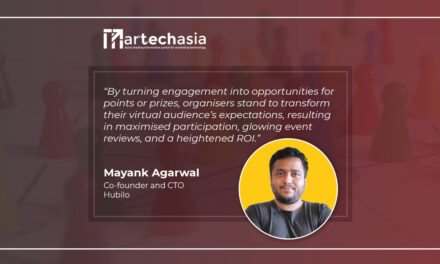Marketers need to ride the crest of MarTech trends in Asia Pacific, to maintain market leadership in the region, like how Burger King did…
Businesses in Asia Pacific have faced tremendous challenges and undergone incredible changes since the COVID-19 pandemic, and this has continued in 2023.
The rapid development of technologies, changes in customer behaviour and preferences, and rise in geopolitical challenges, are impacting business leaders in calibrating their marketing strategies to tide over the new uncertainties.
To stay ahead of the game, one of the top ways market leaders can remain relevant with their target audience is to keep abreast of the trends to meet the challenges that may impact their business.
MartechAsia sought out some insights into the key challenges, trends and developments that would impact marketers in Asia Pacific the most in 2023, in this interview with Srinivas Gattamneni, Chief Executive Officer, ADA.
What are some top marketing technology trends you foresee in 2023 – especially when organisations find themselves in a cookieless world?
Srinivas Gattamneni (SG): This year’s main subject of economic uncertainty suggests that marketers will likely be pushed to accomplish more with less. While challenging, there are plenty of opportunities that quick-thinking and proactive brands may take advantage of. Some of the trends that we can look out for include:
- Maximising marketing tech stack investments
- There will be a greater focus by companies to drive ROI from their investments.
- Marketers began to invest substantially in technology as a result of the pandemic’s push on digital transformation.
- As compared to 58% in 2020, marketers now utilise 42% of their MarTech stack capabilities today (Gartner).
- This is due to increasing complexities in Marketing Technology, with new disruptions and innovation; from attribution to segmentation, to customer experience management, organisations still need to adapt to the availability of this new technology. Hence, there will be focus by companies to drive ROI from their investment.
-
Greater integration between marketing tech tools
- With tighter privacy laws and increasingly complex platforms, channels, and audiences, clients will crave standardised platforms to build operations, from data analysis, website content creation, data collection to automated workflows.
- A deeper partnership between the Marketing and IT functions will be required to create greater integration and shared infrastructures between various marketing tech tools.
-
2023 will be the year of Customer Data Platform (CDP)
- Businesses have been talking about Customer Data Platforms (CDP) since 2019, but we believe that 2023 will be the year where every organisation will focus on having CDP implemented.
- As companies tighten their wallets, there will be more focus to measure and attribute every dollar spent in advertising and marketing. It is even more crucial in a cookieless world, as marketers will want to get the most out of first-party data. CDP will enable companies, maximise their own customer base, monetise all the different data that exists and create a 360-degree view of the consumer.
- In other words, it will be the holy grail for connecting all customer data within the organisation, going far beyond what we now know of Customer Relationship Management (CRM).
In 2023, marketers will start focusing on building customer experiences on top of third-party platforms and ensure that every interaction between consumer and the company becomes a potential touchpoint to drive commerce. This encompasses experiences from the moment a potential customer sees an ad to the eventual purchase process, to post-purchase as well.
What opportunities and challenges can we expect to see in the marketing technology space?
SG: With technology constantly evolving, the challenges and opportunities that we foresee for the years to come will impact many different audiences.
-
Marketers will face challenges in adapting to new browser policies, but have the opportunity to rethink customer touch points to drive more personalised experiences.
- The sophisticated customer profiles that have been created through cookies and the current digital ad ecosystem has over time made it simple for advertisers and marketers to target specific consumers. However, because of upcoming changes to data privacy laws and data restrictions imposed by web browser on websites with enabled data sharing properties, marketers will need to find alternative data sources to third-party cookies, to continue gathering customer insights.
- Businesses can however use this as an opportunity to revaluate their own client and customer touchpoints to decide how best to effectively collect first-party data.
- Finding the ideal omnichannel blend of digital and in-store experiences is essential. This means the possible integration of emerging technology such as conversational chatbots. Through chatbots, businesses can conduct sentiment analysis based on interactions with customers to know if their products are up to scratch. Businesses can also use automated chat commerce to up-sell and cross-sell, leaving more complex tasks to human customer service agents.
-
Acquiring and retaining the right skilled talents to drive marketing outcomes and fully utilise the marketing technology capabilities.
- Brands, as well as many other companies, face an ongoing challenge of talent acquisition and retention.
- Technology is used by brands to drive marketing outcomes but without the right talent, these investments may not reach their full potential. Brands must outline an all-encompassing strategy that addresses people, processes, technology, and data in order to attract and retain the right talent. As a result, they will be able to continuously develop and offer their clients a seamless customer experience.
- This is the time for brands and organisations to reimagine talent retention brands by looking inwards to their existing talent and identifying areas or opportunities for growth and upskilling. Research has indicated that companies are not investing enough in their people with more than 40% of employee fears being linked to their employers not teaching them the technology skills they need. Organisations must recognise that upskilling is not a stop-gap measure and view it as a long-term investment in valuing their employees.
-
Innovation and implementation of campaigns will be a challenge for marketing agencies, but an opportunity to relook how brands can have constant engagement with consumers
- 2023 will be a challenging economic year with many companies experiencing budget reductions in preparation of a possible recession. Agencies would then be under pressure to deliver consistent results at reduced budgets, which would impact the implementation of campaigns.
- At the same time, agencies then have the opportunity to transform their offerings and provide better data and e-commerce services, reasserting their ability to enhance campaigns for marketers. Agencies can step up and help marketers to manage their first-party data, navigate their own sets of data, and reach directly to the right consumers for their clients.
- Marketing agencies would therefore need to look at how can brands keep consumers constantly engaged through various touchpoints.



















